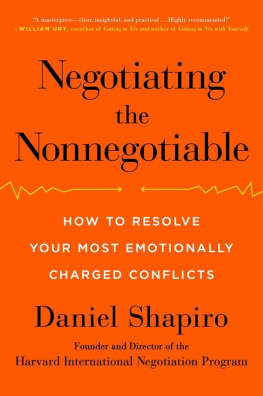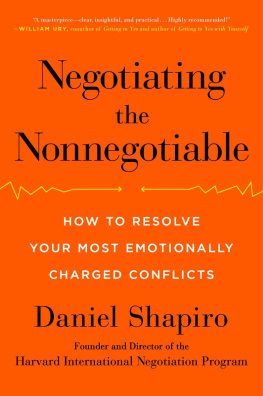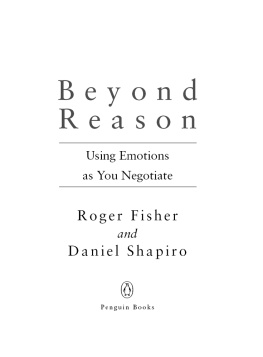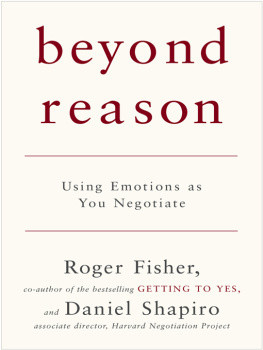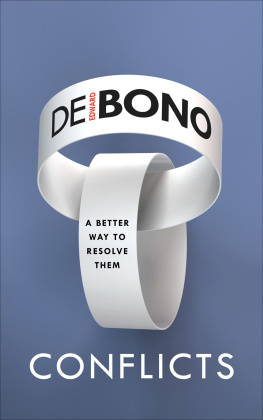Praise for Daniel Shapiros Negotiating the Nonnegotiable
Dan Shapiro has written a masterpiececlear, insightful, and practicalabout the most difficult and emotionally charged of negotiations: those that revolve around identity. Highly recommended!
William Ury, coauthor of Getting to Yes and author of Getting to Yes with Yourself
Daniel Shapiros Negotiating the Nonnegotiable is a modern masterpiece. Bold and compelling from the first page, he shines a light on the dark divisive forces of conflict while describing pathways toward peace and harmony through the power of reconciliation and affiliation. It is the ultimate proof that addressing conflict requires a courageous head as much as a collaborative heart. Every leader should read it and live by it.
Katherine Garrett-Cox, CEO, Alliance Trust Investments
Negotiating the Nonnegotiable is one of the most important books of our modern era. Dan Shapiro gives us a whole new set of tools to tackle our toughest disputesthose that threaten our identity. This brilliant book is innovative, practical, and exactly what we need in todays world.
Jaime de Bourbon de Parme, Ambassador of the Netherlands to the Holy See
Negotiating the Nonnegotiable is a fascinating read that gets to the core of all kinds of conflicts. Daniel Shapiro draws on his lifetimes work to examine processes that lead from discord to harmony and from war to peace. His book is a gripping account of how people of every persuasion can come together and find a new beginning. Anyone with an interest in the work of reconciliation, peace building, and conflict resolution should read this book.
Bertie Ahern, Former Prime Minister of Ireland 19972008; conegotiator of the Good Friday Agreement
As Commander of the NYPD Hostage Negotiation Team for over fourteen years, I have been involved in many dangerous nonnegotiable negotiations, where a tactical resolution often had to be realized. In Negotiating the Nonnegotiable, Dan Shapiro unlocks the strategies to reconcile strained relationships and find the hidden possibilities for resolution. An extraordinary book that will change your life.
Lt. Jack Cambria, Commanding Officer NYPD Hostage Negotiation Team (Retired)
Dan Shapiro has written a book that is at once both profound and practical, heartfelt and hopeful. At a time when one of our worlds most alarming fault lines is the growing polarization between individuals and groupsdivided by race, ethnicity, politics, religion, or classimmersion in his wisdom is a must for anyone trying to prevent or resolve these conflicts.
Matthew Bishop, senior editor of The Economist Group; cofounder of the Social Progress Index
No one has thought more deeply and creatively about the impact of emotions on conflict than Dan Shapiro. In Negotiating the Nonnegotiable, Dan draws on that depth of knowledge to develop a workable method that enables us to deal effectively with emotional conflicts that all too often seem nonnegotiable.
Jeswald W. Salacuse, Henry J. Braker Professor, the Fletcher School of Law and Diplomacy, Tufts University; author of Negotiating Life
A wise bookfull of experience, heart, and intelligenceit will give every reader insights to consider and plans to enact. We can hope that no conflict is intractable, thanks to this book. And it has great stories.
Susan T. Fiske, Eugene Higgins Professor of Psychology and Professor of Public Affairs, Princeton University
What a powerful book! Negotiating the Nonnegotiable is both entertaining and deeply enriching, with a comprehensive content and a diversity of examples from daily life and global contexts. I wish I would have known much earlier in life about the ideas in this book, including my vertigo syndrome! Shapiro provides us with a fabulous invitation to consistently trade disharmony for harmony.
Alain Robert, Vice Chairman, UBS Wealth Management
This fascinating book tells us a lot about the role of identity in international conflicts and how to bridge the divide. It expands our understanding of the political reconciliation in the international system.
Professor Yan Xuetong, Dean of the Institute of Modern International Relations, Tsinghua University (China)
Welcome to Negotiation 3.0! Dan Shapiro gives us new eyes through which to understand even the most difficult negotiationsand a powerful new tool kit to overcome them. Negotiators from both my own country of Japan and from around the world will be inspired by this important new text and will benefit immensely from it.
Jiro Tamura, Professor of Law, Keio University, President, Negotia Club (Japan)
In Negotiating the Nonnegotiable, part manual and part memoir, Dan Shapiro offers insight into negotiation and identity culled from an extraordinary career working on critical conflicts around the world. Negotiating the Nonnegotiable is sure to be required reading for diplomats and peace builders alike seeking more effective practice and a broader toolbox for solving seemingly intractable conflicts.
Nancy Lindborg, President, United States Institute of Peace
VIKING
An imprint of Penguin Random House LLC
375 Hudson Street
New York, New York 10014
penguin.com
Copyright 2016 by Daniel L. Shapiro
Penguin supports copyright. Copyright fuels creativity, encourages diverse voices, promotes free speech, and creates a vibrant culture. Thank you for buying an authorized edition of this book and for complying with copyright laws by not reproducing, scanning, or distributing any part of it in any form without permission. You are supporting writers and allowing Penguin to continue to publish books for every reader.
: Drawing Hands by M. C. Escher. Used by permission of The M. C. Escher Company
ISBN 9781101626962
EXPORT EDITION ISBN 9780399564406
Version_1
To Mia,
Noah, Zachary, Liam,
Mom & Dad, Maddie & Mike, Steve & Shira,
Margaret, Betsy & Peter, and Susan,
for teaching me about
lifes one nonnegotiable: love.
The Challenge
EVERY GENERATION OF HUMANKIND BELIEVES THEY ARE
MORE EVOLVED, MORE SOPHISTICATED, MORE MODERN
THAN THOSE WHO CAME BEFORE THEM.
YET NO MATTER HOW FAST SOCIETY ADVANCES,
PEOPLE IN CONFLICT ARE, AND ALWAYS WILL BE, HUMAN.
THE CHALLENGE IS HOW TO BRIDGE THE DIVIDE WHEN
OUR MOST FUNDAMENTAL VALUES ARE ON THE LINE.
HOW DO WE
NEGOTIATE THE NONNEGOTIABLE?
Contents
Introduction: Why This Book?
Negotiating the Nonnegotiable introduces a new paradigm for resolving conflictone that speaks as much to the heart as to the head. Just as scientists have discovered the inner workings of the physical world, my research in the field of conflict resolution has revealed emotional forces that drive people to conflict. These forces are invisible to the eye, yet their impact is deeply felt: They can tear apart the closest friendship, break up a marriage, destroy a business, and fuel sectarian violence. Unless we learn to counteract such forces, we will tend to engage repeatedly in the same frustrating conflicts, with the same frustrating results. This book provides the necessary tools to overcome these dynamics and foster cooperative relations, turning the most emotionally charged conflict into an opportunity for mutual benefit.
The need for a new paradigm struck me twenty-five years ago in a caf in the splintering state of Yugoslavia. I had just facilitated a weeklong workshop on conflict resolution for teenage refugeesSerbs, Bosnian Muslims, and Croatsand several of us were now discussing the differences between life . The sound of gunfire still echoed in the minds of these teenagers, but here we were, in the eye of a hurricane, drinking Turkish coffee and talking about soccer and who in our workshop had a crush on whom. Among us was long-haired, blue-eyed, seventeen-year-old Veronica, who stared straight ahead with unnerving intensity. She had said little throughout our workshop, so I was surprised when, during a pause in the chatter, she suddenly spoke.

